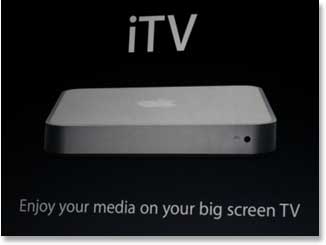I've blogged
before on Digital Rights Management and Apple, calling for them to openly license their FairPlay music DRM. A friend made the case this would never happen, because handing out DRM secrets would defeat the purpose of DRM, by allowing hackers in. Instead Steve Jobs made moves to help dismantle DRM in the music world, as a variety of record companies have opted for distributing unshackled music. He wrote a letter stating that Apple was only locking up the music they sell because their contracts with the music providers required it. And if there was to be any loosening of restrictions on downloaded music it needed to come from the record companies. And that he was all for it. Steve wrote an open letter, the industry changed, as evidenced by Amazon's sale of unlocked MP3s.
So while Steve was helping to dismantle DRM in the music world, he was secretly building a device that would leverage DRM in the world of high-definition movies in a way that could potentially make him a very rich man. Perhaps richer than Bill Gates.
Steve gave the movie studios exactly what they wanted for content protection on Apple TV, and in the process became a middleman for every Hollywood studio interested in renting HD movies over the Internet. Not to mention the manufacturer of the device you will invite into your home to provide these locked-down HD movies for a finite rental.
That bears repeating. You are going to pay Steve Jobs over $200 to place a movie rental device of his choice in your living room. It does many things, but the movies you rent will be locked to the device, and will only play over an encrypted HDMI link on an HD TV.
Of course this device will be completely Mac and iPod friendly, therefore encouraging more sales of other Apple products.
The guy is a genius of navigating the shoals of digital computing and media. He's already traded some of this genius for a seat on the board of Disney (and the largest pile of shares). I'd list him as a singular example of how a corporate board (Apple) might have acted reasonably in lavishly rewarding the CEO.
He'll be one of the most famous, if not
the most famous, of historical computer personages from the first sixty years of computing when looked at a hundred years hence. Up there with Von Neumann I'd guess, as the two names to memorize in middle school. Bill Gates will be like Andrew Carnegie, more famous for the money he gave away then how he made it.
Steve Jobs rode an idea into the future, and he's remained focused on the possibilities for new uses over the opportunities for economic growth. Both are necessary. Just a matter of which hand you let steer.
%3B.jpg)




